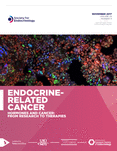Highly prevalent TERT promoter mutations in aggressive thyroid cancers
- Xiaoli Liu,
- Justin Bishop,
- Yuan Shan,
- Sara Pai,
- Dingxie Liu,
- Avaniyapuram Kannan Murugan,
- Hui Sun,
- Adel El-Naggar and
- Mingzhao Xing⇑
- X Liu, Endocrinology and Metabolism, The Johns Hopkins University Schoo of Medicine, Baltimore, United States
- J Bishop, Pathology, The Johns Hopkins University Schoo of Medicine,, Baltimore, United States
- Y Shan, Anatomic Pathology and Neuro-Oncology, Moffitt Cancer Center, Tampa, United States
- S Pai, Otolaryngology—Head and Neck Surgery, The Johns Hopkins University Schoo of Medicine, Baltimore, United States
- D Liu, Division of Endocrinology and Metabolism, The Johns Hopkins Medical Institutions, baltimore, 21287, United States
- A Murugan, Endocrinology and Metabolism, The Johns Hopkins University Schoo of Medicine, Baltimore, United States
- H Sun, Department of Thyroid and Parathyroid Surgery, China-Japan Union Hospital, Jilin University, Changchun, China
- A El-Naggar, Pathology, University of Texas M. D. Anderson Cancer Center, Houston, United States
- M Xing, Endocrinology and Metabolism, The Johns Hopkins University Schoo of Medicine, Baltimore, 21287, United States
- Correspondence: Mingzhao Xing, Email: mxing1{at}jhmi.edu
Abstract
Mutations 1,295,228 C>T and 1,295,250 C>T (termed C228T and C250T, respectively), corresponding to -124 C>T and -146 C>T from translational start site in the gene promoter of the telomerase reverse transcriptase (TERT), have been recently reported in human cancers, but not in thyroid cancer yet. We explored these mutations in thyroid cancer by genomic sequencing of a large number of primary tumors. We found the C228T mutation in 0/85 (0.0%) benign thyroid tumors, 30/257 (11.7%) papillary thyroid cancer (PTC), 9/79 (11.4%) follicular thyroid cancer (FTC), 3/8 (37.5%) poorly differentiated thyroid cancer (PDTC), 23/54 (42.6%) anaplastic thyroid cancer (ATC), and 8/12 (66.7%) thyroid cancer cell lines. The C250T mutation was uncommon but mutually exclusive with C228T, and the two mutations were collectively found in 11/79 (13.9%) FTC, 25/54 (46.3%) ATC, and 11/12 (91.7%) thyroid cancer cell lines. Among PTC variants, C228T was found in 4/13 (30.8%) tall-cell PTC (TCPTC), 23/187 (12.3%) conventional PTC, and 2/56 (3.6%) follicular variant PTC. No TERT mutation was found in 16 medullary thyroid cancers. The C228T mutation was associated with the BRAF V600E mutation in PTC, being present in 19/104 (18.3%) BRAF mutation-positive PTC versus 11/153 (7.2%) BRAF mutation-negative PTC (P = 0.0094). Conversely, BRAF mutation was found in 19/30 (63.3%) C228T-positive PTC versus 85/227 (37.4%) C228T-negative PTC (P = 0.0094). We thus for the first time demonstrate TERT promoter mutations in thyroid cancer, particularly prevalent in aggressive thyroid cancers TCPTC, PDTC and ATC and BRAF mutation-positive PTC, revealing a novel genetic background for thyroid cancer.
- Received 8 June 2013
- Accepted 11 June 2013
- Accepted Preprint first posted online on 13 June 2013












